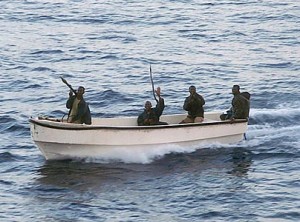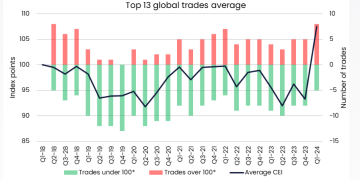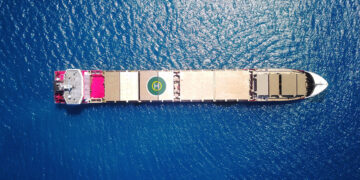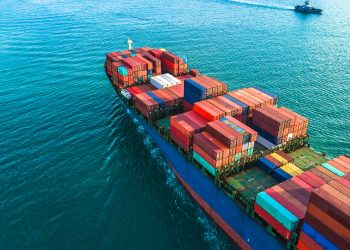Stand up for self-defence
A recent statement on piracy gave only tepid support for armed guards but it is high time for the IMO to act boldly.
The International Maritime Organization makes an American politician proud. It agilely straddles the fence while testing the waters, keeping a foot in each camp, bending an ear to the rail and watching the political storm clouds.
That dull thud you just heard was the anticipated statement on the carriage of armed guards on our ships.
The IMO response is not helpful. It does little. As Sherlock Holmes once pointed out, it is completely accurate and completely useless. It may be harmful because the point is missed and piracy goes on with its kidnappings, ransoms, deaths and tortures of our seafarers.
When will the IMO get it? The number of ship transiting pirate waters in northeastern Africa is large. The number of attacks and captures is small. The success rate of the attackers is substantial. Why? Pirates go for the low-hanging fruit. Easy pickings are easy money and there is a lot of fruit nowadays.
Pirates, however, are cowards. They do not like to get shot. They like to go back home and enjoy the cash largesse. If one is dead it is hard to enjoy the largesse.

If one is a pirate, however, and the likelihood of being shot is substantial – it only takes one marksman and one bullet – it is rationally likely that one will be very careful in investigating a target.
Flight will be the first line of defence at resistance. Citadels? Navies? Electric shocks? Lasered eyes? Water cannons? Razor wire? Loud noises? Interesting, ineffective and usually from the imaginations of people who have no idea about maritime realities. And they are costly. What works on the cheap? Private armed guards.
This is the rule: some 80% of the fire in an infantry fixed engagement suppresses the enemy. It does not kill or wound him. That means that the infantryman in the foxhole is interested in getting back home to enjoy the largesse of his government for his selfless service. One cannot do that if one is dead.
Soldier life insurance is cold comfort in the foxhole, although it may be welcomed in its consequences back home. One chooses not to be grievously wounded either. It is risky, one may not survive for long and it hurts a lot.
Consider a vessel and think of it as a floating foxhole. That skiff and its squadron coming over the horizon are merely other floating foxholes. A field of fire set off from the higher-in-the water floating foxhole will divert their lower-down floating foxholes. Why? Conrad said it: “It is bad enough to die for commerce…”
What if the next floating foxhole is armed, too, what now, doughty lads? Maybe he is armed and maybe he is not. Hard to say. Let us draw nigh and observe. Let us draw his fire, if any.
Alongside, a hail of bullets and no letters to mother regretfully informing about the glorious demise of Aziz and his martyred tribal cohorts. No soldier life insurance either.
Private armed guards can and will suppress piracy.
The IMO is unique in being the only intergovernmental organisation legislating for our industry. This position must now be used boldly. The most recent statement on piracy gave tepid support to guards. We hope it will not become the embrace of death through faint flattery.
Stop the charade. The current situation is brigandage and highwaymen afloat. These human vermin are one of the abominations of mankind. Private state-sanctioned force against private unlawful force is the correct answer. Money masquerading for force spent by naval patrols is foot-tapping, gourd-rattling, chalk-faced kabuki. It is expensive for not much result.
I urge the IMO and stakeholders to get back to the real problem with a real solution. Use the powers of tacit acceptance. Treat what I have proposed in this journal as a technical change to the Safety of Life at Sea Convention.
Solas is designed to protect souls on board. If protection against pirates is not in the thrust of Solas, what is? Provide the states parties two things: the leadership to change laws and the mechanism to do so. Amend Solas in the International Ship and Port Facility Security Code.
Provide for limited transactional immunity from prosecution and civil suit for any private person who in good faith injures a putative pirate. This puts self-defence on a firm a priori footing. It gives uniformity to the effort. It urges states with no piracy laws to consider and deal with piracy for what it is.
Piracy is contagious. We should not be surprised to see piracy popping up more frequently. Fishermen are becoming targets off the west coast of South America. Piracy in Nigeria will only grow. The Straits are about ripe for another outbreak.
If we do not suppress piracy now we will begin seeing commerce-raiding privateering without letter of marque. It is not far-fetched. The mothership phenomenon presages it. Will we send a navy after a raider? No.
As abhorrent as it may be to some, as off-putting as a licence to kill may be to others, the carriage of armed guards in private service can and will be effective. Who pays for it? It is trivial flag state money. The cost to arm one ship for a brief part of its voyage is about the same as a large reception and party at a flag state embassy. And the owner will reimburse the state.
Is the suppression of piracy not a proper function of flag states? You may rest assured that it is and remains wholly a flag state responsibility. By a flagged company paying for the guards and getting reimbursed by the state, and flag state law providing limited transactional immunity, a loud message is sent: this flag state will not accept piratical incursions on its vessels.
One would hope this ship has not left the pier for the IMO. Please, IMO, do your duty and act. Your seafarer constituency is counting on you.
John AC Cartner




























































